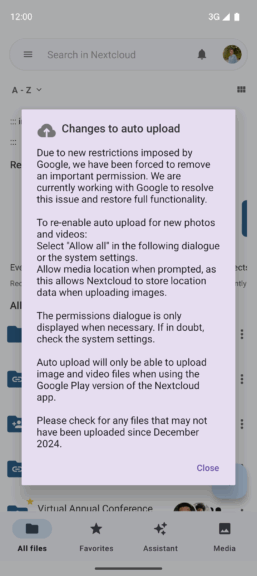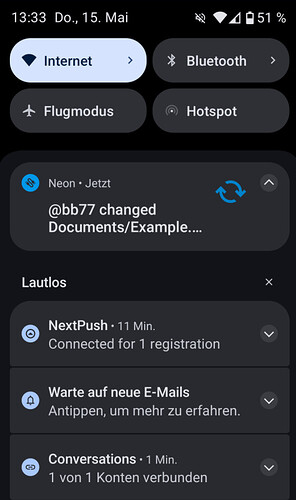Originally published at: Unhappy with the recently lost file upload feature in the Nextcloud app for Android? So are we. Let us explain. - Nextcloud
Dear users,
Good news. This morning, May 15, Google reached out to us and offered to restore the permission, which will give our users back the functionality that was lost.
We are preparing a test release first (expected tonight) and a final update with all functionality restored. If no issues occur, the update will hopefully be out early next week!
Thanks to your continued support 💙
Sincerely, the Nextcloud team
This update was posted on May 15, 2:50 pm CET (original post below)
Dear users,
We are aware that for some months, Nextcloud file uploads for Android users have not been working as expected: you cannot upload all data to your Nextcloud, only photos and videos. We have seen your complaints in various forums such as the Nextcloud help forum, on GitHub, Reddit, or other forums.
As your experience with the Nextcloud Files app for Android has worsened, we wanted to share the background. Google has revoked a critical permission to sync all files. Despite multiple appeals since mid-2024, Google has refused to reinstate it, forcing us to limit file uploads for millions of users.
The Nextcloud file uploads issue means that some media files, such as pictures and videos, can still be uploaded from Android devices to Nextcloud, but all other files cannot. And that is pretty much beating the purpose.
Google is stating security concerns as a reason for revoking the permission. This is hard to believe for us. Nextcloud has had this feature since its inception in 2016, and we have never heard about any security concerns from Google about it. Moreover, several Big Tech apps as well as Google’s own still have this. What we think: Google owning the platform means they can and are giving themselves preferential treatment.
Despite multiple appeals since mid-2024, Google has refused to reinstate the permission, blocking automated Nextcloud file uploads for millions of users.
To make it crystal clear: All of you as users have a worse Nextcloud Files client because Google wanted that. We understand and share your frustration, but there is nothing we can do.
The more tech-savvy of you are certainly able to use the alternative app store, such as F-Droid. But for our user base of roughly one million users on the app store, this will hardly be an option.
For transparency, we have compiled more background below to help you understand the Nextcloud file upload issue and how Google is abusing its gatekeeper position.
Sincerely, the Nextcloud team

What happened with Nextcloud file uploads for Android?
The permission for read and write access to all file types for the Nextcloud Files app for Android was granted in 2011. In September 2024, an update of the Nextcloud app for Android was refused out of the blue. We have been asked to remove the permission to all files or use “a more privacy aware replacement” like Storage Access Framework (SAF) or MediaStore API.
SAF cannot be used, as it is for sharing/exposing our files to other apps, so the reviewer clearly misunderstood our app workflow. MediaStore API cannot be used as it does not allow access to other files, but only media files.
Despite multiple appeals from our side and sharing additional background, Google is not considering reinstating uploads for all files. Instead of working collaboratively to solve the issue, we only receive the same copy-and-paste answers or links to documentation. With nearly a million users and an 8-year history, it is hard to argue that our Android app has no credibility. So it is very surprising to get treated this way to the disadvantage of our users.
As we needed to release bug fixes to our users and customers, and there was no other way to discuss, we chose to comply with Google’s new regulations. Google finally accepted our newest update, which limits uploads for our users.
The Android app itself still works with the permission, and we released new versions on the external F-Droid store. So the limit is a “purely” Google Play Store-related problem.
The bigger picture: Big Tech gatekeeping in action
This might look like a small technical detail, but it is clearly part of a pattern of actions to fight the competition. What we are experiencing is a piece of the script from the Big Tech playbook.
It is a clear example of Big Tech gatekeeping smaller software vendors, making the products of their competitors worse or unable to provide the same services as the giants themselves sell. As they own the platform, they can — and do — give themselves preferential treatment.
A famous example of this in the past was Microsoft, which blocked certain capabilities from Windows to ensure WordPerfect users had a worse experience than people who picked Microsoft Word. Today, Google creates rules in the name of security that make it hard to build products that compete with them.
We suppose Google can’t get away with this versus Apple or Microsoft, as those companies would retaliate. But smaller companies, especially those building disruptive technologies like ours, are fair game for them.
Big Tech is scared that small players like Nextcloud will disrupt them, like they once disrupted other companies. So they try to shut the door.
Then they have an army of underpaid and overworked people who have to ‘handle the complaints’. Clearly, they have either been directed to simply remove this permission from Nextcloud and ignore any complaints, or they are entirely incompetent. Either way, it results in companies like ours just giving up, reducing functionality just to avoid getting kicked out of their app store.
This isn’t an isolated issue. With the EU’s lack of enforcement on Microsoft’s bundling of Teams and OneDrive into Windows, it seems Google feels emboldened to follow suit, further stifling competition and innovation.
The issue is that small companies — like ours — have pretty much no recourse. Legal actions are too expensive, and a complaint to the EU takes too long. Together with about 40 other businesses and organizations, we filed a complaint about similar anti-competitive behavior in 2021. We are now four years in, and nothing has happened. What do you think happens to a company that releases no updates to its app in four years?
The current oversight processes are absolutely useless against these billion-dollar companies. Even the fines against Meta and Apple under the Digital Markets Act (DMA) in April 2025 were surprisingly low. Remember, fines can be up to 10% of the company’s total worldwide annual revenue. While fines of €200 million or €500 million, respectively, sound a lot, it could have been in the billions. These Big Tech firms earn that much money in a matter of days, so it amounts to barely a slap on the wrist.
And it took a while. The regulation becomes applicable in May 2023 in the EU to make the markets in the digital sector fairer and more contestable. The first fines were announced almost two years later, which is an immense time span in the digital world, and this is just the first step. The firms will put their lawyers to work and appeal — expect this to take another year or two. The EU really has to step up its game if it is serious about reducing the anti-competitive behavior of Big Tech.
Discover the latest Nextcloud Hub
Download the latest version of Nextcloud Hub here. Or if you are new – start your instant trial right away!
